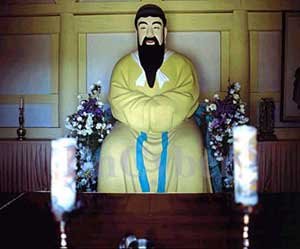I know I haven't been writing much about my experiences recently, but in all honesty nothing big has been happening and I'm becoming increasingly interested in Korean history, philosophy and politics. I do have a few posts to write, but I'm trying to gather all the information I need before I can present it to you. I got the idea for this post the other day when I was talking to Aaron about Korean mythology.
Like a lot of Asiatic cultures, Korea has their share of myths and they usually involve animals and nature. Remember, Korea has a rich religious history, although over half of the population alive now claims to be secular. The original religion of Korea was a form of the Eurasian shamanism and the totemism of Far East Asia, specifically of the nomadic peoples of present-day Manchuria. These were strongly influenced by the later importations of Buddhism, Confucianism and Taoism from China. I'll talk about religion in Korea after I visit some temples and familiarize myself with what's written and what's practiced. I mention past religion in order to give a background to the myth I'm about to explain to you. Harmony with the world is always paramount with Asian religion, so using flora and fauna in a myth only makes sense.
This is the creation of the Corean. (The "C" was changed to "K" during the Japanese occupation from 1910-1945. Japan did this so Corea would not be presented before Japan was during the opening ceremonies of the Olympics. You'll see the Corean spelling a lot here, but there is no push to change it back.) Buried deep in the subconscious memory of descendants of Asiatic tribes that moved into southern Manchurua and the Korean Peninsula lies the myth of Tan'gun. Hwanin, the heavenly king, had a son, Hwanung, who wished to live on earth among men. Accompanied by 3,000 followers, Hwanung descended from heaven and appeared under a sandalwood tree on Myohyong-san (san is mountain) in North Korea. He ruled over the people that he found there, teaching them agriculture, arts and social behavior. Here he is...
There was a bear and tiger in this land who wished to become human. They prayed to Hwanung to fulfill their wish, and he looked favorable upon them. Giving each 20 or so cloves of garlic and a bunch of mugwort, he told them to take only that nourishment and to stay out of the sun for 100 days. They retired to a cave and took the food. Because of growing impatience and hunger, the tiger left the cave. The bear, however, endured and was turned into a woman. (Note the feminine characteristics of the bear compared with the masculine traits of the tiger.)
Happy with the fulfillment of her wish, she prayed under the sandalwood tree to become a mother. Hwanung gladly obliged, and the bear-woman bore Tan'gun, The sandalwood King. Tan'gun became the first human king of the people of the peninsula, establishing his capital at Wanggom (current day Pyongyang) in 2333 B.C. and calling his kingdom Choson meaning morning calm or morning freshness. That is the literal meaning of "Korea" as well.
Of course, no one really believes this myth anymore, but it's still used to foster Korean nationalism. Koreans, like Americans, also have a "Manifest Destiny" chip on their shoulder, but I'll discuss that later on as well. They believe that there is a Korean race. This "race" is apparently the purest in the world and there are even Korean biologists, anthropologists and other scientists who claim the same. Naturally, this is not true, but they DO believe themselves to be of a pure or divine race. Classic.
To that I say, if they're so pure and divine, then why does a tremendously large percentage of the population get plastic surgery? I tell you next time...





3 comments:
Thanks for this bit of Korean lore. The picture of Hwanung..reminds me a bit of the guy in the other room at the Chinese restaurant that takes care of naughty little boys! Inside joke for George. :0)
Yeah, no "happy little buddah's" over there? You're lucky because it sounds like you've been acting pretty wild and he definitely would've had to take you in that back room with the rest of the naughty little boys. Ha!
actually, the c to k for korea change is just the opposite. when the japanese colonized the place it was known as 'korea,' after the koryo dynasty, which the north koreans currently claim to be the heirs to. the japanese didnt like korea being AFTER them in things like the olympics, and, as a colonial power, changed the k to a c. you'll still see it spelled with a c in spanish and a few other european languages, as well as in the romanized russian and chinese renderings of the country's name.
Post a Comment